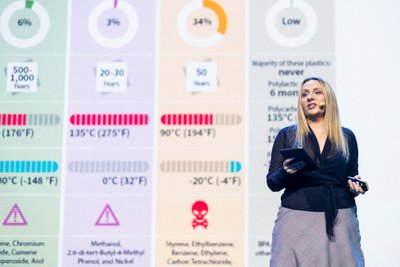Rosalie Mann, the founder of „No More Plastic“, and Doina Ciobanu, a model from Moldova and a United Nations Sustainable Development Programme Ambassador, both participated in the LOGIN conference, where they discussed who is responsible for plastic pollution and highlighted the severe impact of the issue on impoverished regions of the Global South.
„It would be unfair to blame individuals for plastic pollution – after all, we all purchase these products, often out of necessity. I tried going plastic-free for a week and realised it was nearly impossible, especially in a large city like Paris. Such initiatives are also very expensive,“ said Mann.
„I come from Moldova, which for many years was the poorest country in Europe. Now it is the second poorest. Coming from an economically weak country, I perfectly understand that environmental issues, including plastic pollution, are the most pressing for developing countries,“ added Ciobanu.

According to Ciobanu, while in Europe it is quite challenging to find alternatives to plastic, it is not impossible to do.
„In the slightly wealthier regions of Moldova, you may find water in glass bottles, but in most places the only option is plastic, as tap water is undrinkable. This issue extends beyond Moldova – it is relevant to all countries in the Global South,“ the United Nations Sustainable Development Programme Ambassador explained.
As Ciobanu highlights, the more closely we look at the problem from an economically disadvantaged perspective, the better we understand the impact it has on poorer nations.
„My passion for this cause was ignited by a trip to Bali, a place I had envisioned as paradise. Upon arrival, I encountered a beach littered with mountains of plastic waste. This plastic came from various Asian countries. While strolling through European cities, I seldom notice so much plastic waste, but my experience in Bali was an eye-opener,“ Ciobanu admitted.
Plastic Particles Are Everywhere
According to Mann, in order to understand the problem of excessive plastic, we need to realise that plastic is everywhere and often invisible to the naked eye. Plastic degrades into micro and nano plastic particles that contaminate the air. According to the founder of „No More Plastic“, we constantly inhale and ingest these particles, our skin absorbs them, leading to continues exposure to toxins.
„This greatly affects Bali, as well as the Mediterranean Sea, which is the most polluted sea in the world in terms of macroplastics. This is an urgent issue requiring immediate intervention by politicians and business“, Mann stated.

According to Mann, over 50% of plastic waste comes from packaging and textiles. The key message is clear – the focus should be on reducing plastic production and finding sustainable alternatives.
Greenwashing Misleads Even the Most Conscious Consumers
The European Union recently reported that at least 60% of ecological claims made by the European fashion industry are false. However, there is hope – the EU is pushing for stringent penalties against companies that engage in greenwashing. This initiative is already implemented in the Nordic countries, with Norway serving as a role model in combating greenwashing.
„The statistics are shocking, and the question is how consumers can discern truth from falsehood. Consumers are trying to make more conscious choices, but misleading claims about environmental benefits complicate their efforts,“ Ciobanu remarked.
According to her, fast fashion receives the most criticism. Consumers are generally aware that fast fashion is often associated to unfair labour practices and the use of low-quality materials.
„Despite this awareness, the lack of transparency when it comes to luxury goods bothers me the most. When consumers purchase items costing €2,000, €3,000 or even €10,000, they expect transparency, accountability, and sustainability. Unfortunately, even in the luxury market, synthetic materials dominate, and workers are underpaid and exploited,“ the model said.

As Mann emphasises, although many companies are promoting the benefits of recycled plastics both for the planet and human health, this narrative is incomplete and often serves as another form for greenwashing.
„Recycling plastics produces a significant amount of microplastics that pollute our air, water, and soil. In my opinion, this is one of the worst forms of greenwashing in the industry today – the misleading promotion of recycled plastics as a sustainable solution,“ she explained.
Polyester made from recycled plastic bottles is frequently marketed as a sustainable solution. However, as the model from Moldova explains, plastic bottles can be recycled into polyester fiber only once.
„Once the fiber is produced, it cannot be recycled again - it cannot be turned back into plastic bottles or recycled into any other form. This marks the end of its lifecycle. Despite this important limitation, products made from recycled plastic bottles have become very popular in recent years, often without consumers being aware of the material’s recycling restrictions,“ said Ciobanu.
The model from Moldova suggested that a viable solution how to get rid of the excess plastic waste might not be technical, but rather natural. Nature itself offers a remedy – worms that feed on plastic.
„I do not know the exact name, but I met a researcher who patented this type of worm. This could definitely be a good solution to reduce plastic waste instead of solely relying on recycling. However, it is enough to solve the entire problem,“ Ciobanu concluded.

